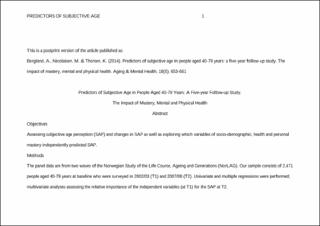Predictors of subjective age in people aged 40-79 years: a five-year follow-up study. The impact of mastery, mental and physical health
Peer reviewed, Journal article
Accepted version
Permanent lenke
https://hdl.handle.net/11250/2679520Utgivelsesdato
2014Metadata
Vis full innførselSamlinger
Originalversjon
Bergland, A., Nicolaisen, M., & Thorsen, K. (2014). Predictors of subjective age in people aged 40–79 years: a five-year follow-up study. The impact of mastery, mental and physical health. Aging & Mental Health, 18(5), 653-661. https://doi.org/10.1080/13607863.2013.869545Sammendrag
Assessing subjective age perception (SAP) and changes in SAP as well as exploring which variables of socio-demographic, health and personal mastery independently predicted SAP. Methods: The panel data are from two waves of the Norwegian Study of the Life Course, Ageing and Generations (NorLAG). Our sample consists of 2,471 people aged 40-79 years at baseline who were surveyed in 2002/03 (T1) and 2007/08 (T2). Univariate and multiple regressions were performed; multivariate analyses assessing the relative importance of the independent variables (at T1) for the SAP at T2. Results: Older chronological age, good physical health, good mental health, a high level of personal mastery and having lower education significantly predicted a youthful SAP. For the whole sample, older age and a high level of personal mastery were the most important predictors. For those aged 40 to 49 being a man, having lower education, good physical health and high personal mastery predicted a younger SAP, whereas in the group aged 50-59 years being married/cohabiting and having a high level of education were predictors of an older SAP. For those aged 60-69, high personal mastery was the only independent predictor of a younger SAP. For those aged 70-79 years, only health – good mental and physical health – independently predicted a younger SAP.. Conclusions: Most respondents feel younger than their chronological age, the more the older they are. Self-rated physical and mental health and personal mastery are associated with subjective age perception and vary in different age groups
